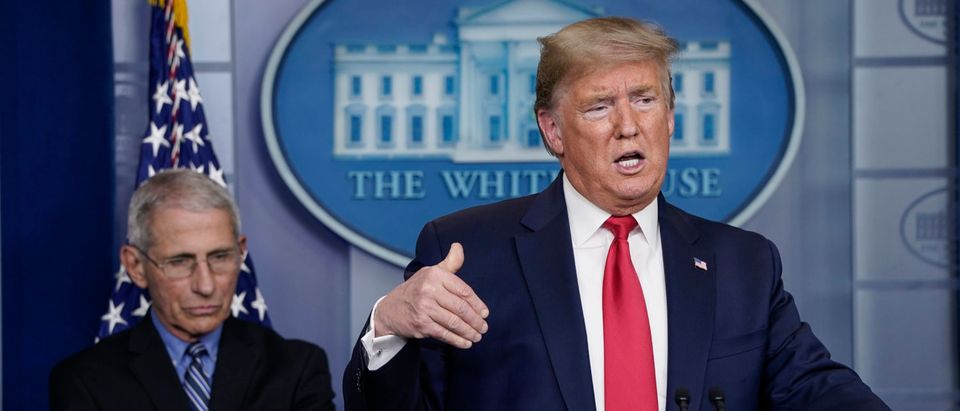Editor’s note: We endeavor to bring you the top voices on current events representing a range of perspectives. Below is a column arguing that the government response to coronavirus has been reasonable and does not permanently endanger civil liberties. You can find a counterpoint here, where Republican National Lawyers Association co-Chair Harmeet K. Dhillon argues that the actions taken by local and state governments in response to the coronavirus outbreak pose a threat to Americans’ civil liberties.
Some conservatives worry that the escalating national, state, and local lockdowns, shelter-in-place mandates and other regulations designed to halt the global coronavirus pandemic constitute a massive government overreach.
Or worse — a systematic assault by government at all levels on fundamental American civil liberties. Are we seeing a gateway to tyranny? Are we on a slow slide to Beijing-style authoritarian capitalism?
Hardly.
I’m partial to libertarian thinking. By this I mean wherever possible and practical, maximizing the freedoms and choices available to individuals is the best course of action. Most of us appreciate that many of the civil liberties enshrined in our Constitution’s Bill of Rights are not absolute — people understand why they can’t shout fire in a crowded theater.
If we consider today’s situation from the perspective of economics (and the legitimate, appropriate case for government intervention), it’s not time to panic.
A global pandemic resembles what economists call an externality — a costly event, similar to downstream pollution, where the problem’s creator doesn’t bear the costs imposed on others. Those costs are borne by innocent individuals, companies, communities or governments.
The coronavirus began in Wuhan, China. There will undoubtedly be a spirited debate as to whether the Chinese government should foot some or all of the costs imposed on the global community because of its decision to mask the initial health risks. China’s Community Party leaders knowingly withheld critical health data from the rest of the world early on. (In doing so, they also demonstrated why open societies will always flourish and prosper far more than closed, authoritarian societies.)
Today’s governmental response to the coronavirus pandemic is appropriate, because if left to their own actions, individuals will most likely further transmit the virus unwittingly. Thus far, restrictions have been measured and based on the best available facts, sophisticated epidemiological modeling, prior experience with similar viruses and a determination to protect the health and safety of the American people.
This health crisis is a collective problem that requires a temporary, short-term collectivist response. The emphasis here is on temporary and short-term. When the coronavirus recedes, American life should (and will) return to what it was like before the virus emerged.
Those harboring legitimate doubts about our post-virus future should remain vigilant, speak out and even protest if their fears appear warranted. In China, there’s a growing likelihood that the Wuhan crisis may be used to rationalize more extensive governmental use of artificial-intelligence to monitor individual actions and erode personal privacy.
We’re not China. At the same time, we should resist efforts that may tend towards government overreach or extending restrictions longer than needed. Leaders in both parties have, for the most part, been handling this pandemic professionally and openly.
Governors Cuomo, Hogan and Newsom (among others), along with President Donald Trump and his White House Task Force, have been reassuring. Anthony Fauci, whose public exposure dates to the AIDS epidemic’s early days, has been remarkable. Doctor Fauci is no dictator; he’s an American hero.
Several times in our history, presidents have acted harshly with respect to suspending civil liberties: John Adams’s Alien and Sedition Acts, Lincoln’s suspension of habeas corpus, Woodrow Wilson’s limits on speech and press freedoms and FDR’s internment of American citizens of Japanese descent. In hindsight, these actions were difficult to square with our Constitution. We also know that they were temporary.
Adam Smith wrote two famous books. Many conservatives like to cite “The Wealth of Nations,” which celebrates individual freedoms and the power of an “invisible hand” to drive market-based outcomes. But Smith’s personal favorite was his earlier work, “The Theory of Moral Sentiments,” which emphasizes the importance of community values that strengthen the common good.
An externality, by definition, represents a market failure inviting some form of intervention for the common good. Government pursuit of the common good doesn’t mean that we’re suddenly becoming collectivists hell-bent on reducing individual freedoms.
As individual citizens, we can (and must) play a role in ensuring that today’s governmental response to the coronavirus pandemic is timely, targeted, and temporary. And who knows, in dealing with this national and global challenge, we might even discover some important things about who we are as a people.
If Andrew Cuomo can say nice things about Donald Trump, and vice versa, then perhaps anything is possible.
Charles Kolb served as Deputy Assistant to the President for Domestic Policy from 1990-1992 in the George H.W. Bush White House


